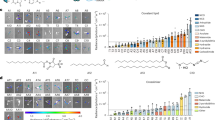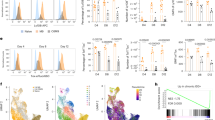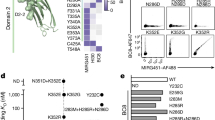Abstract
Stromal cells play a critical role in haematopoiesis, both in a permissive and, probably, in a directive manner1–5. Study of the interactions between stromal cells and haematopoietic stem cells, however, is difficult to perform using whole bone marrow, in which stem cells are indistinguishable from precursor cells and maturing haematopoietic cells, and where stromal and haematopoietic cells co-exist in a heterogeneous mixture. We have purified primitive haematopoietic spleen colony-forming cells (CFU-S) using fluorescence-activated cell sorting (FACS) and produced CFU-S populations which approach 100% purity (ref. 6 and B.I.L. and E.S., in preparation). This cell population is devoid of significant stromal cells and mature haematopoietic cells. Here, we report that when purified CFU-S are seeded onto a stromal adherent layer in vitro, foci of haematopoietic cells develop within the stroma followed by production of a wave of maturing and mature progeny. However, self-renewal of CFU-S does not occur and haematopoietic activity rapidly declines, indicating that caution should be applied in the use of highly purified stem cells for human bone marrow transplantation.
This is a preview of subscription content, access via your institution
Access options
Subscribe to this journal
Receive 51 print issues and online access
$199.00 per year
only $3.90 per issue
Buy this article
- Purchase on Springer Link
- Instant access to full article PDF
Prices may be subject to local taxes which are calculated during checkout
Similar content being viewed by others
References
Dexter, T. M., Spooncer, E., Simmons, P. & Alien, T. D. in Long-Term Bone Marrow Culture (eds Wright, D. G. & Greenberger, J. S.) 57–96 (Liss, New York, 1984).
Schofield, R. & Dexter, T. M. Leukemia Res. 9, 305–313 (1985).
Dexter, T. M. J. cell. Physiol. Suppl. 1, 87–94 (1982).
Wolf, N. S. Clin. Haemat. 8, 469–500 (1979).
Dexter, T. M. & Moore, M. A. S. Nature 269, 412–414 (1977).
Visser, J. W. M., Bauman, J. G. J., Mulder, A. H., Eliason, J. F. & de Leeuw, A. M. J. exp. Med. 159, 1576–1590 (1984).
Dexter, T. M., Spooncer, E., Varga, J., Allen, T. D. & Lanotte, M. in Haematopoietic Stem Cells (eds Killman, Sv-Aa, Cronkite, E. P. & Muller-Berat, C. N.) 303–322 (Munksgaard, Copenhagen, 1983).
Spooncer, E. & Dexter, T. M. Biblioth. Haemat. 48, 366–383 (1984).
Schofield, R. Blood Cells 4, 7–25 (1978).
Trigg, M. E. et al. Expl. Hemat. 12, 412 (1984).
Hows, J., Parreira, A., Yin, J., Goldman, J. & Gordon-Smith, E. C. Exp Hemat. 12, 412 (1984).
Till, J. E. & McCulloch, E. A. Radiat. Res. 14, 213–222 (1961).
Author information
Authors and Affiliations
Rights and permissions
About this article
Cite this article
Spooncer, E., Lord, B. & Dexter, T. Defective ability to self-renew in vitro of highly purified primitive haematopoietic cells. Nature 316, 62–64 (1985). https://doi.org/10.1038/316062a0
Received:
Accepted:
Issue Date:
DOI: https://doi.org/10.1038/316062a0
This article is cited by
-
Evaluation of in vivo and in vitro repopulation assays for murine haemopoietic stem cells
Comparative Haematology International (1992)
-
In vitro frequency analysis of spleen colony-forming and marrow-repopulating hemopoietic stem cells in the mouse
Journal of Tissue Culture Methods (1991)
Comments
By submitting a comment you agree to abide by our Terms and Community Guidelines. If you find something abusive or that does not comply with our terms or guidelines please flag it as inappropriate.



